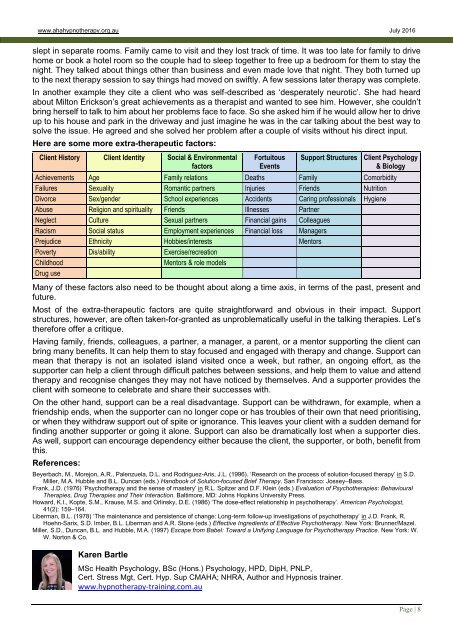The Australian Hypnotherapy Journal
296nlgS
296nlgS
Create successful ePaper yourself
Turn your PDF publications into a flip-book with our unique Google optimized e-Paper software.
www.ahahypnotherapy.org.au July 2016<br />
slept in separate rooms. Family came to visit and they lost track of time. It was too late for family to drive<br />
home or book a hotel room so the couple had to sleep together to free up a bedroom for them to stay the<br />
night. <strong>The</strong>y talked about things other than business and even made love that night. <strong>The</strong>y both turned up<br />
to the next therapy session to say things had moved on swiftly. A few sessions later therapy was complete.<br />
In another example they cite a client who was self-described as ‘desperately neurotic’. She had heard<br />
about Milton Erickson’s great achievements as a therapist and wanted to see him. However, she couldn’t<br />
bring herself to talk to him about her problems face to face. So she asked him if he would allow her to drive<br />
up to his house and park in the driveway and just imagine he was in the car talking about the best way to<br />
solve the issue. He agreed and she solved her problem after a couple of visits without his direct input.<br />
Here are some more extra-therapeutic factors:<br />
Client History Client Identity Social & Environmental<br />
factors<br />
Fortuitous<br />
Events<br />
Support Structures<br />
Client Psychology<br />
& Biology<br />
Achievements Age Family relations Deaths Family Comorbidity<br />
Failures Sexuality Romantic partners Injuries Friends Nutrition<br />
Divorce Sex/gender School experiences Accidents Caring professionals Hygiene<br />
Abuse Religion and spirituality Friends Illnesses Partner<br />
Neglect Culture Sexual partners Financial gains Colleagues<br />
Racism Social status Employment experiences Financial loss Managers<br />
Prejudice Ethnicity Hobbies/interests Mentors<br />
Poverty Dis/ability Exercise/recreation<br />
Childhood<br />
Mentors & role models<br />
Drug use<br />
Many of these factors also need to be thought about along a time axis, in terms of the past, present and<br />
future.<br />
Most of the extra-therapeutic factors are quite straightforward and obvious in their impact. Support<br />
structures, however, are often taken-for-granted as unproblematically useful in the talking therapies. Let’s<br />
therefore offer a critique.<br />
Having family, friends, colleagues, a partner, a manager, a parent, or a mentor supporting the client can<br />
bring many benefits. It can help them to stay focused and engaged with therapy and change. Support can<br />
mean that therapy is not an isolated island visited once a week, but rather, an ongoing effort, as the<br />
supporter can help a client through difficult patches between sessions, and help them to value and attend<br />
therapy and recognise changes they may not have noticed by themselves. And a supporter provides the<br />
client with someone to celebrate and share their successes with.<br />
On the other hand, support can be a real disadvantage. Support can be withdrawn, for example, when a<br />
friendship ends, when the supporter can no longer cope or has troubles of their own that need prioritising,<br />
or when they withdraw support out of spite or ignorance. This leaves your client with a sudden demand for<br />
finding another supporter or going it alone. Support can also be dramatically lost when a supporter dies.<br />
As well, support can encourage dependency either because the client, the supporter, or both, benefit from<br />
this.<br />
References:<br />
Beyerbach, M., Morejon, A.R., Palenzuela, D.L. and Rodriguez-Aris, J.L. (1996). ‘Research on the process of solution-focused therapy’ in S.D.<br />
Miller, M.A. Hubble and B.L. Duncan (eds.) Handbook of Solution-focused Brief <strong>The</strong>rapy. San Francisco: Jossey–Bass.<br />
Frank, J.D. (1976) ‘Psychotherapy and the sense of mastery’ in R.L. Spitzer and D.F. Klein (eds.) Evaluation of Psychotherapies: Behavioural<br />
<strong>The</strong>rapies, Drug <strong>The</strong>rapies and <strong>The</strong>ir Interaction. Baltimore, MD: Johns Hopkins University Press.<br />
Howard, K.I., Kopte, S.M., Krause, M.S. and Orlinsky, D.E. (1986) ‘<strong>The</strong> dose-effect relationship in psychotherapy’. American Psychologist,<br />
41(2): 159–164.<br />
Liberman, B.L. (1978) ‘<strong>The</strong> maintenance and persistence of change: Long-term follow-up investigations of psychotherapy’ in J.D. Frank, R.<br />
Hoehn-Sarix, S.D. Imber, B.L. Liberman and A.R. Stone (eds.) Effective Ingredients of Effective Psychotherapy. New York: Brunner/Mazel.<br />
Miller, S.D., Duncan, B.L. and Hubble, M.A. (1997) Escape from Babel: Toward a Unifying Language for Psychotherapy Practice. New York: W.<br />
W. Norton & Co.<br />
Karen Bartle<br />
MSc Health Psychology, BSc (Hons.) Psychology, HPD, DipH, PNLP,<br />
Cert. Stress Mgt, Cert. Hyp. Sup CMAHA; NHRA, Author and Hypnosis trainer.<br />
www.hypnotherapy-training.com.au<br />
Page | 8


